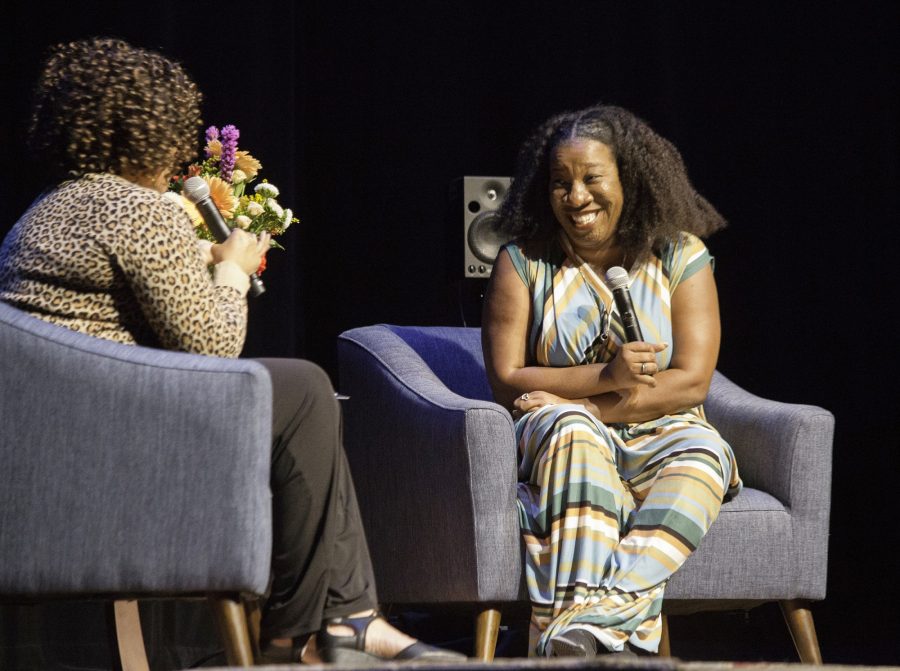
Lauren Trench
A “fireside chat,” with Tarana Burke, founder of the #metoo movement at the University of Arizona in Tucson on Wednesday, October 30, 2019.
Two years on from the #MeToo explosion, creator Tarana Burke stressed that the movement is still focused on survivors.
Burke spoke with University of Arizona professor Stephanie Troutman about the movement Wednesday, Oct. 30 at Centennial Hall.
“I never thought that this would happen, but I also never thought I would see a time in our country where we could have a sustained dialogue around sexual violence,” Burke said.
RELATED: The Women’s March returns to Tucson with hundreds gathering in solidarity
The goal of the movement, according to Burke, is to support survivors of sexual violence and convince people to take action to end sexual violence.
“The Me Too movement is about healing and action,” Burke said. “We are about making sure that survivors have what they need, the resources they need to cultivate their own healing journey, and about moving people to action that is necessary to end sexual violence. Anything else is a distraction.”
Though the #MeToo hashtag became popular in 2017, Burke created the movement years prior. She recalled a workshop she attended the May before the hashtag went viral.
“I went to this gathering of activists who worked in child sexual abuse and we had to bring an item to the gathering and I brought a Me Too t-shirt,” Burke said. “Everywhere I go, when I do the workshops, I bring these classic t-shirts … And I said, ‘If I can manifest something, I really need to figure out how to get the world to understand this work.’”
Burke said the young people are going to save us, but also stressed the importance of intergenerational involvement and studying past movements.
“I do think young folks who are brilliant and smart and ready and have great analysis skills need to study movement,” Burke said. “You need to study movement. These people who built these movements that we’re standing on were brilliant. They were brilliant and we need to take some of that, and we can shift it around, whatever, but not romanticize it.”
Troutman asked Burke to comment on the claims on white women co-opting the movement.
“I know that when the Me Too movement … when the hashtag went viral and folks were talking about it, one of the things that popped up immediately in circles of feminist women of color was ‘White women, trying to take it, they always do this,’” Troutman said.
Burke said she understands that perspective, but they’re still survivors.
“I get black girl pain very well, and I understand where that comes from,” Burke said. “If we look at the timeline, the stories came out about [Harvey] Weinstein end of September, end of October. The whole world explodes, it’s all Weinstein everything, and you have these actresses who’ve come forward. The reality is, those actresses, yes they’re white, yes they’re famous, yes they’re whatever. They’re survivors. And they came forward with their stories of survival, not expecting to start a movement at all. In fact, they thought, ‘This might be the end of my livelihood.’”
One audience question Troutman asked was Burke’s advice for survivors who don’t want to share their story.
Burke said she’s encountered many young people wanting to tell their story but not feeling ready.
“My answer, all the time, is don’t,” Burke said. “You don’t owe anybody your story. If you don’t feel compelled to tell your story, if you don’t feel like you need to tell your story and do it publicly, you are not obligated to. In fact, this is why I exist. I am here, on this stage, I do this work and the people who do this work with me do it so you don’t have to tell your story. You do not have to say, ‘Me Too,’ to be apart of the Me Too movement.”
RELATED: OPINION: Being apolitical is pointless
Looking forward, Burke created a new hashtag, #MeTooVoter, to encourage participation in upcoming elections.
“#MeTooVoter is about survivors coming together to push back against this narrative that we are hateful and not powerful,” Burke said. “It is about holding these politicians feet to the fire and saying, ‘Part of your leadership has to include my safety.’ It is about really just getting them to be responsible for the millions and millions of people who said Me Too who are still waiting for an answer from the leadership in this country.”
Follow Priya Jandu on Twitter
–
COPY
Stephanie Troutman, UA prof, she/her/hers
Tarana Burke, creator of Me Too movement, she/her/hers